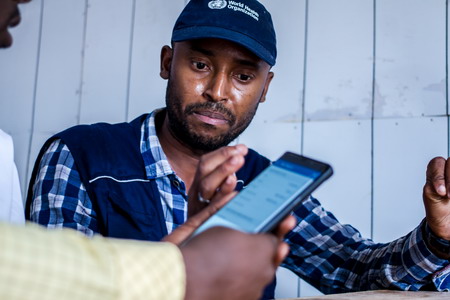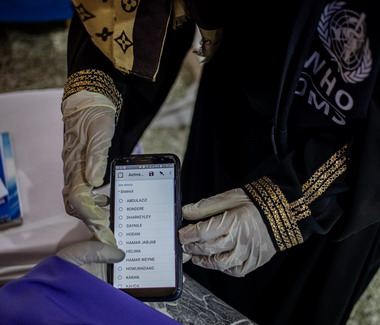
23 April 2020 – In Somalia's COVID-19 response, being ahead of the curve is the only way to stop transmission and limit spread of the virus in the community. Enhancing active surveillance and expanding its geographic coverage to include both the private and public sector using a syndromic-based approach is the best way to detect cases early.
In Somalia, in the absence of any routine disease surveillance system, EWARN is doing what it was intended to do and what the system did best in other outbreak situations.
EWARN, a disease surveillance system for epidemic-prone disease, was initially launched in Somalia in 2008 but due to operational difficulties was halted only to be reactivated by WHO together with federal and state health authorities in 2017 as a real-time password protected web-based electronic surveillance system. This reactivation came after one of the worst cholera outbreaks in Somalia in the past decade when there was no reliable disease surveillance system in the country to monitor, detect and respond to the cholera outbreak and other epidemic-prone diseases and health threats.
By 2019, an estimated 6.5 million people, including 2 million internally displaced people, were covered by the EWARN system. Currently, 535 out of 1075 health facilities across the country are covered by EWARN; 64% of these facilities submit their EWARN reports on time and 74% of the reports are complete. In 2019 alone, 74 new health facilities were added to the EWARN system. A record 4 789 832 consultations were reported in 2019 through the EWARN system. Knowledge of patient consultations and population coverage helps WHO and other health partners to measure the consultation rate and identify gaps in health care access in vulnerable populations. In 2019, the system triggered over 18 000 outbreak alerts, of which 883 were verified through field investigation by WHO and the health authorities.

In a country like Somalia which has a fragile health system, EWARN has been able to detect and prevent epidemics in real time in drought-affected districts, camps for internally displaced people in different states, including their host communities, and districts inaccessible to humanitarian agencies or the government. As the system relies on electronic data collection using a mobile phone-based application data on epidemic-prone diseases can be regularly collected and collated, even from insecure and inaccessible areas of the country, This would not have been possible if EWARN relied on a paper-based system for data collection.
As the country grapples with increased transmission of COVID-19, the EWARN system has been rolled out to another 200 health facilities, including all privately owned medical facilities which are admitting and treating patients with acute respiratory diseases of unknown origin. Using online training platforms adapted to the country need and context, the WHO country office through its Public Health Emergency Officers is conducting training at each of these newly enroled health facilities, including the private sector hospitals on use of syndromic case definition for COVID-19 and early recognition and reporting of suspected case. The training also includes data entry and reporting using both the web-based application and mobile platform of the EWARN system. In addition to 14 epidemic-prone diseases that are already included in the system (e.g. waterborne, vaccine-preventable, vector-borne and mixed transmission diseases), the case definition for COVID-19 has been added as the newly reportable health condition in the EWARN as part of roll out.
Event-based surveillance
Another important innovation for the EWARN roll out during this period of COVID-19 has been the addition of event-based surveillance system which is intended to capture non-specific and other respiratory diseases of unknown origin in the EWARN for triggering alert and appropriate investigation.
Understanding the evolution and transmission dynamics of any epidemic remains a challenge even in countries with good health system and functioning surveillance system. Somalia, a country with fragile health systems and with no routine disease surveillance system, the challenges are immense and overwhelming. The EWARN data on COVID-19 cases (either suspected or confirmed) will provide a snapshot of epidemic size, geographic spread and stages which is important for understanding and analyzing the effectiveness of response strategies for containment and suppression of the virus.
The other main advantage of EWARN being rolled out for COVID-19 is the use of its GPS coordinates which will allow alerts of the location of a suspected case or event of a cluster of cases to be precisely pinpointed and automatically displayed on the electronic dashboard. This will eventually help in efficient contact tracing and identifying more suspected cases in the vicinity of the alert of this event or a spectacled case.
Since the EWARN system is supported by a mobile app linked to its web-based platform, local health workers in inaccessible areas will also be able to use the app to submit real-time data on COVID-19 electronically thus overcoming security and geographic barriers.
As the roll out begins, a weekly bulletin will also be generated automatically from the system, which will show all alerts but also distilled for COVID-19 by health facility and geographic location.
The EWARN surveillance system continues to transform the way Somalia detects an epidemic disease including the COVID-19 in the absence of any routine disease surveillance system in a very complex setting. In addition, to disease detection and monitoring, the data generated from EWARN for COVID-19 will be useful for understanding the burden and help to prioritize, plan, implement and monitor the health emergency response in the country. Like what has been done in the past, the EWARN continues to keep the country safe and protect the vulnerable by early detection and response to epidemic threats posed by COVID-19 in the country. The success and experience of EWARN, as an early warning disease surveillance system during this period of COVID-19 will be useful for other emerging health threats as the country transitions from a state of protracted crisis to early recovery and development. The current work of WHO country office in responding to COVID-19 is also a demonstration of WHO’s commitment to and capability of supporting the health needs of the Somali people especially in a crisis of this scale.
The implementation of the EWARN system has greatly improved the detection, verification, investigation and reporting of diseases of public health importance in the country in real time, and the sharing of relevant health information with health partners and stakeholders to guide response activities and monitor the trends of these diseases across the country.
Related links
Access the latest information and global updates


